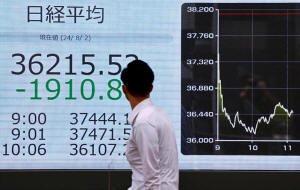Fears for US economy drive tech-led global stock slump
 Send a link to a friend
Send a link to a friend
 [August 02, 2024] By
Naomi Rovnick [August 02, 2024] By
Naomi Rovnick
LONDON (Reuters) - Global stocks dropped sharply on Friday, with
richly-valued tech groups taking much of the pain, as investor anxiety
about a U.S. economic slowdown sent shockwaves through markets already
rattled by downbeat earnings updates from Amazon and Intel.
With thin summer trading likely exaggerating moves, a slump that began
in Asia with a 5.8% drop for Japan's Nikkei share index, its biggest
daily fall since the March 2020 COVID-19 crisis, rippled through Europe
and was set to continue on Wall Street later in the day.
MSCI's broad gauge of global stocks dropped 0.8%, Europe's Stoxx share
index fell 1.8%.
Futures trading implied Wall Street's S&P 500 would open 1.2% lower and
contracts that track the tech-heavy Nasdaq 100 index lost 1.8%, setting
the gauge up for a 10% fall from its record closing high.
The VIX measure of U.S. stock market volatility, known as Wall Street's
fear gauge, rose to its highest reading since April and U.S. Treasuries
rallied as traders poured into the benchmark debt securities viewed as
havens.
The sell-down followed a softer than expected U.S. factory activity
survey on Thursday and came ahead of Friday's monthly U.S. non-farm
payrolls report, which economists forecast will show job growth dropped
to 175,000 in July from 206,000 in June.

The U.S. Federal Reserve has kept benchmark borrowing costs at a 23-year
high of 5.25%-5.50% for a year and some analysts believe the world's
most influential central bank may have kept monetary policy tight for
too long, risking a recession.
"The historical experience is that turnarounds in the labour market can
occur quickly and brutally and that relatively moderate increases in
unemployment have been enough to trigger recessions in the United
States," SEB US economist Elisabet Kopelman said.
Money markets on Friday priced a 31% chance of the Fed, which is widely
expected to cut rates in September and November, implementing a jumbo 50
basis points cut next month to insure against a downturn.
"That does feel like we have jumped the gun," Fidelity International
fixed income manager Shamil Gohil said.
He added, however, that "we will also be watching for a rise in the
unemployment rate which will give us clues about a weaker labour market
and as a potential recessionary signal."
Shares in U.S. chipmaker Intel tumbled more than 20% lower in pre-market
trading on Friday after the group suspended its dividend and revealed
plans to cut 15% of its workforce.
Artificial intelligence chipmaker Nvidia, one of the biggest
contributors to the tech rally, dropped 3% pre-market.
[to top of second column] |

A person walks in front of an electronic screen displaying Japan's
Nikkei share average outside a brokerage in Tokyo, Japan August 2,
2024. REUTERS/Issei Kato

European tech stocks swooned 4.6% lower.
Nvidia, up more than 700% since January 2023, has left many asset
managers with an outsized exposure to the fortunes of this single
stock.
Steven Bell, chief economist for EMEA at asset manager Columbia
Threadneedle, said that while investors were trimming big tech
positions to rebalance their portfolios the U.S. was not about to
contract.
"Personally, I'm not thinking I should run for the hills," he said.
"This is a slowdown, not a recession. And the background of lower
interest rates, lower inflation and real wages rising because
inflation is falling faster than wage growth, all of that's quite
positive."
Haven buying went full throttle on Friday, however.
The 10-year Treasury yield was 4 bps lower on the day 3.978% on
Friday after dropping as much 14 bps overnight. Bond yields fall as
prices of the securities rise.
The two-year yield, which typically reflects near-term interest rate
expectations, dropped to 4.1244%.
The 10-year German bund yield, a benchmark for euro zone debt costs,
fell 4 bps to 2.201%.
In foreign exchange markets, sterling was on track for a 1% weekly
drop against the dollar as traders speculated that the Bank of
England would follow its first rate cut of this cycle on Thursday
with another in November.
Commodity markets broadly displayed global growth fears as gold
added 0.7% to $2,464 an ounce and Brent crude oil, although slightly
up on the day at $79.70 a barrel, headed for a fourth successive
weekly loss.
(Additional reporting by Rae Wee in Singapore. Editing by Christian
Schmollinger, Andrew Heavens and Louise Heavens)
[© 2024 Thomson Reuters. All rights
reserved.]
This material may not be published,
broadcast, rewritten or redistributed.
Thompson Reuters is solely responsible for this content.
 |